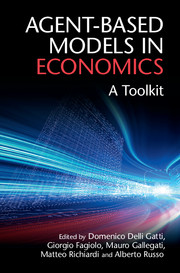Book contents
- Frontmatter
- Dedication
- Contents
- List of Figures
- List of Tables
- List of Contributors
- Preface
- 1 Introduction
- 2 Agent-Based Computational Economics: What, Why, When
- 3 Agent-Based Models as Recursive Systems
- 4 Rationality, Behavior, and Expectations
- 5 Agents’ Behavior and Learning
- 6 Interaction
- 7 The Agent-Based Experiment
- 8 Empirical Validation of Agent-Based Models
- 9 Estimation of Agent-Based Models
- 10 Epilogue
- Bibliography
- Index
5 - Agents’ Behavior and Learning
Published online by Cambridge University Press: 02 March 2018
- Frontmatter
- Dedication
- Contents
- List of Figures
- List of Tables
- List of Contributors
- Preface
- 1 Introduction
- 2 Agent-Based Computational Economics: What, Why, When
- 3 Agent-Based Models as Recursive Systems
- 4 Rationality, Behavior, and Expectations
- 5 Agents’ Behavior and Learning
- 6 Interaction
- 7 The Agent-Based Experiment
- 8 Empirical Validation of Agent-Based Models
- 9 Estimation of Agent-Based Models
- 10 Epilogue
- Bibliography
- Index
Summary
Introduction
The fundamental building blocks of every agent-based model are agents. From a general point of view, in order to build an agent-based model, four main issues need to be addressed: (i) the nature of the agents; (ii) the list of variables describing their state; (iii) the list of the actions the agents can perform; (iv) the structure of their interaction with other agents. In what follows, we will discuss the first three points, while the last will be deeply analyzed in Chapter 6.
A peculiar feature differentiating agents in agent-based models from those of mainstream models is their autonomy of action. Indeed, agents in a rationalexpectations- cum-equilibrium model behave according to rules that are not independent of what the others are doing: in any situation, their actions depend on some variable that is determined by the behavior of the entire system. In a typical market model, for instance, a firm must know the actual market price (i.e., market-clearing price) in order to decide its production level, and this price is determined by the interplay of all the agents populating the economy. Hence, agents’ actions are mutually dependent through the equilibrium state or, differently stated, the actual implementation of actions depends on the outcome of actions (outcome ⇒ actions). As this simple but representative example clarifies, mainstream models are dynamically incomplete since no mechanism for out-of-equilibrium dynamics is provided. Thus, the central problem characterizing a decentralized market economy – i.e., the coordination problem – is left aside. On the contrary, the character of autonomy in an agentbased model consists in the existence of a set of behavioral rules allowing agents to take decisions in any situation, independently from what the others are doing and without a central Auctioneer, intervenes as a deus ex machina in determining some sort of equilibrium state. The implementation of actions is not dependent of the outcome of actions. Of course, the final outcome generally will depend on the whole system of interactions among the agents, implying the possibility of individual rationing in case of coordination failures, but this is not an obstacle to the implementation of autonomous decisionmaking. In fact, what makes this possible is that agents’ actions directly influence only other agents’ variables, and not also their own variables. To clarify the point, let us imagine a consumer wanting to buy a good from a shop.
- Type
- Chapter
- Information
- Agent-Based Models in EconomicsA Toolkit, pp. 81 - 108Publisher: Cambridge University PressPrint publication year: 2018

